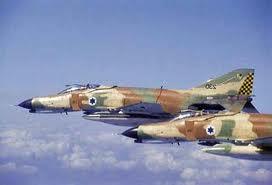Iran's bombAussie intelligence chiefs fear nuclear war between Israel and Iran
WikiLeaks documents show that Australian intelligence agencies fear that Israel might launch military strikes against Iran and that Tehran’s pursuit of nuclear capabilities could draw the United States and Australia into a potential nuclear war in the Middle East; Australia’s top intelligence agency also says that Iran’s nuclear program is intended to deter attack and that it is a mistake to regard Iran as a “‘rogue state”

Israeli Air Force would be the first to engage // Source: crosswalk.com
Australian intelligence agencies fear that Israel might launch military strikes against Iran and that Tehran’s pursuit of nuclear capabilities could draw the United States and Australia into a potential nuclear war in the Middle East.
Australia’s top intelligence agency has also privately undercut the hard line stance toward Tehran of the U.S., Israeli, and Australian governments, saying that Iran’s nuclear program is intended to deter attack and that it is a mistake to regard Iran as a ”rogue state.” The Sydney Morning Herald reports that the warnings about the dangers of nuclear conflict in the Middle East are given in a secret U.S. embassy cable obtained by WikiLeaks and were provided exclusively to the Herald. They reflect views obtained by U.S. intelligence liaison officers in Canberra from across the range of Australian intelligence agencies.
“The AIC’s [Australian intelligence community’s] leading concerns with respect to Iran’s nuclear ambitions centre on understanding the time frame of a possible weapons capability, and working with the United States to prevent Israel from independently launching uncoordinated military strikes against Iran,” the U.S. embassy in Canberra reported to Washington in March last year.
“They are immediately concerned that Iran’s pursuit of nuclear capabilities would lead to a conventional war — or even nuclear exchange — in the Middle East involving the United States that would draw Australia into a conflict.”
Australian concerns about a unilateral Israeli military strike against Iran are also recorded in another U.S. embassy cable, sent to Washington in December 2008, reporting on discussions between the then chief of Australia’s top intelligence agency, the Office of National Assessments (ONA), Peter Varghese, and the head of the U.S. State Department’s Bureau of Intelligence and Research (INR), the assistant secretary of state, Randall Fort.
The embassy’s report of the meeting, which included senior officers and analysts from both intelligence agencies, says that “ONA seniors and analysts were particularly interested in A/S Fort and INR’s assessments on Israeli ‘red lines’ on Iran’s nuclear program and the likelihood of an Israeli strike against Iranian nuclear facilities.”
A cable sent in July 2008 further records that the former prime minister Kevin Rudd was ”deeply worried” that the Iranian President Mahmoud Ahmadinejad’s intransigence concerning Tehran’s nuclear program meant that the window for a diplomatic solution was closing and that “Israel may feel forced to use ‘non-diplomatic’ means.”
Last week Rudd called on Israel, which has a large undeclared nuclear arsenal, to sign the nuclear non-proliferation
